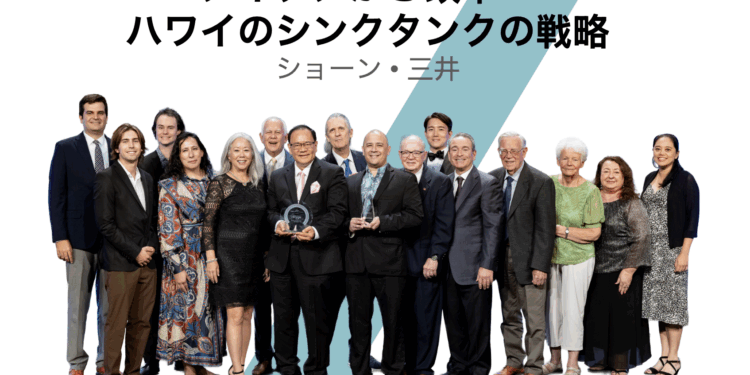Above, Grassroot Institute of Hawaii staff and family appeared on the first slide of Sean Mitsui’s presentation to the Mises Tokyo free economy workshop in Japan. The words say: “From idea to reform / Hawaii think tank strategy / Sean Mitsui.”
The Grassroot Institute of Hawaii’s finance director, Sean Mitusi, carried the message of economic freedom and accountable government to Japan this past September.
He was interviewed by online political influencer Keigo Takasaki, who has more than 213,000 followers on Instagram, and gave an in-person presentation to about two dozen fans of free market economics participating in the annual Mises Tokyo free economy workshop in Yokkaichi city, about 220 miles southwest of Tokyo.
The annual gathering is sponsored by Mises Tokyo, whose members are devoted to learning about the teachings of Ludwig von Mises of the Austrian school of economics.
You can listen to Mitsui’s conversation with Takasaki by clicking on the image below. It would help if you can speak Japanese or have a translator device handy.
The topic of Mitsui’ presentation in Yokkaichi was “From ideas to reform: Strategies behind a Hawaii think tank.”
Two other Hawaii residents also were on hand: Li Schoolland, Acton Institute director of external relations for Asia and the Pacific region, and her husband, Ken Schoolland, a Grassroot Scholar and associate professor of economics and director of the Entrepreneurship Center at Hawai’i Pacific University in Honolulu.
At the workshop in Yokkaichi, Mitsui spoke about Grassroot’s growing influence and impact in Hawaii since it was founded in 2001. He also shared how he became interested in the ideas that Grassroot promotes.
To read Mitsui’s prepared notes for the workshop gathering, see below the Instagram post below.
Mitsui says he “kind of went off script during some parts, and developed some of the concepts more prior to giving the talk.”
Aloha!
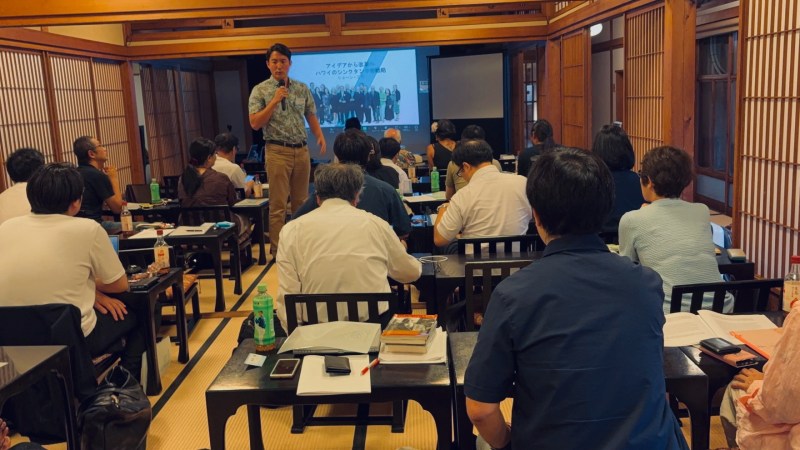
Thank you very much for inviting me to the “Mises Tokyo” free economy workshop. My name is Sean Mitsui. Japan is like a second home to me, and I sincerely hope this country can recover with the right ideas.
Today, I’d like to talk about my home, Hawaii, the organization I work for, and how we’ve been able to bring positive change in Hawaii based on free market principles.
Slide 2: Grassroot Institute of Hawaii
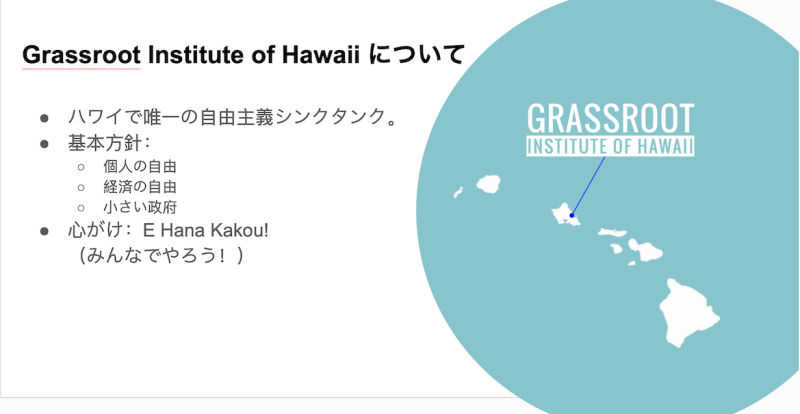
The organization I work for is called the Grassroot Institute of Hawaii. It’s Hawaii’s only free market think tank, and we’re dedicated to making Hawaii a freer, more affordable place to live.
In America, people often use the term “grassroots,” but we chose the singular — “grassroot.” That’s because we believe change starts with the individual — from one root that grows into a larger plant.
We value individual liberty, economic freedom, and a small, accountable government. Even when we don’t always agree with others, we work together in the spirit of “E kana kakou” — “Let’s work together” — to bring about change.
To stay independent, we accept donations from only private individuals and foundations. We never take money from the government.
Today we have nine full-time staff working on policy, communications, lobbying and fundraising — which is my role. Our annual budget is about $1.8 million, supported by about 500 donors.
Slide 3: My introduction
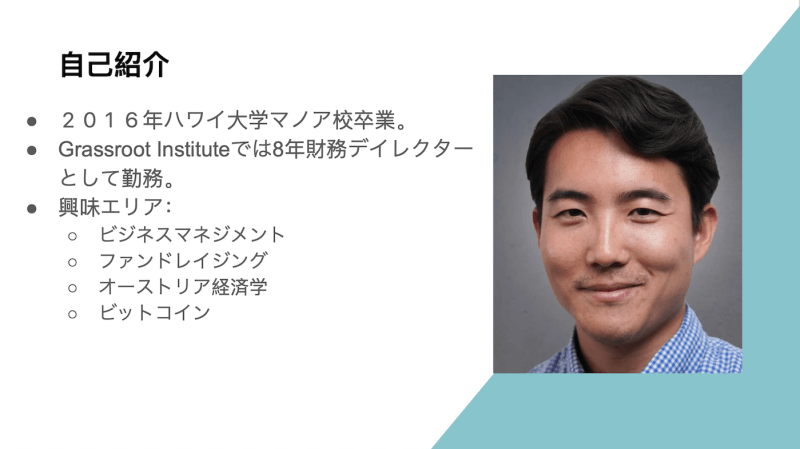
As finance director, my job is to raise money and make sure we use it effectively to maximize our impact. I’ve been with the organization for eight years, and it’s been truly rewarding to work with people who feel like family.
I’ve been a libertarian for over 10 years, influenced by the Austrian school of economics. When I studied business at the University of Hawai‘i at Manoa, most of the classes pushed Keynesian thinking. That made me want to share the correct way of understanding economics. I got involved in student government and joined a libertarian club called Young Americans for Liberty.
Today, my mother is here with me. She runs a medical company in Tokyo and employs many people. Every year she gets more frustrated because the government keeps raising taxes on her and her business. I’m excited for her to see firsthand what I actually do for work.
Slide 4: Hawaii’s political environment
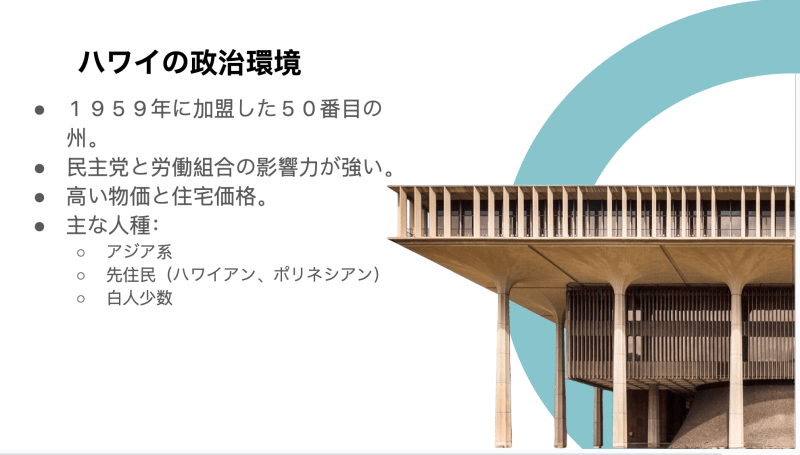
Before talking about the work we do at the Grassroot Institute, let me explain Hawaii’s political environment by comparing it with Japan.
Hawaii became the 50th U.S. state in 1959. Historically, politics there were tied to big businesses, and in reaction, labor unions rose in power, strengthening the Democratic Party.
To this day, the Democrats remain dominant. Their policies have meant more regulation and higher taxes across nearly every sector — housing, healthcare, tourism, and business in general. While framed as “protecting the people,” the reality is Hawaii has just become a much more expensive place to live.
Hawaii is the only U.S. state where Caucasians are a minority, and Japanese, Chinese, Korean and Filipino residents make up the majority. Compared to mainland Americans, people in Hawaii are often more reserved, and it’s harder to openly challenge the status quo.
For example, in Hawaii, you don’t really see the kind of intense excitement around political figures like [U.S. President Donald] Trump or [U.S. Sen. Bernie] Sanders that you find on the mainland.
Slide 5: Our wins
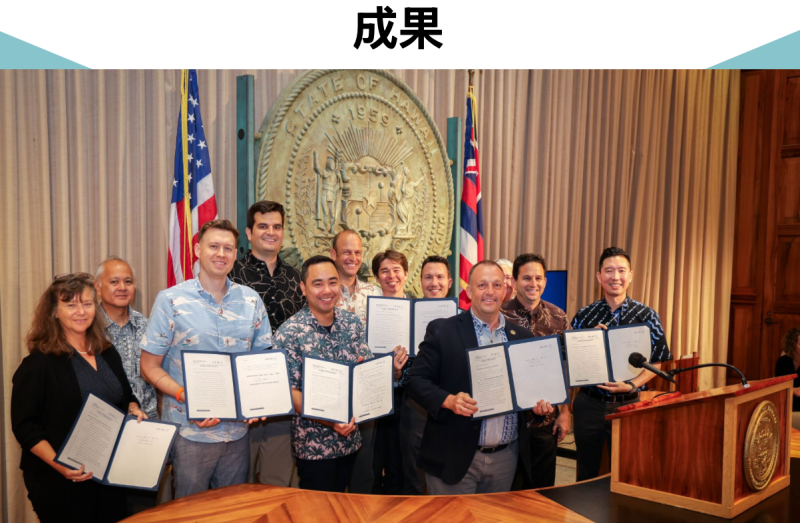
Creating change in Hawaii is not easy, but the Grassroot Institute has had some major wins in the past few years. We’ve even worked behind the scenes with lawmakers, drafting bill language ourselves.
Last year, we helped pass the largest income tax cut in Hawaii’s history. This was huge because normally politicians only ever talk about raising taxes.
We also pushed reforms to make it easier to build housing. This expanded construction freedom and sped up permitting processes. We even used this know-how to help speed up rebuilding efforts in Lahaina.
On top of that, we have successfully helped stop many bad ideas and tax-hike proposals.
Slide 6: Our strategy
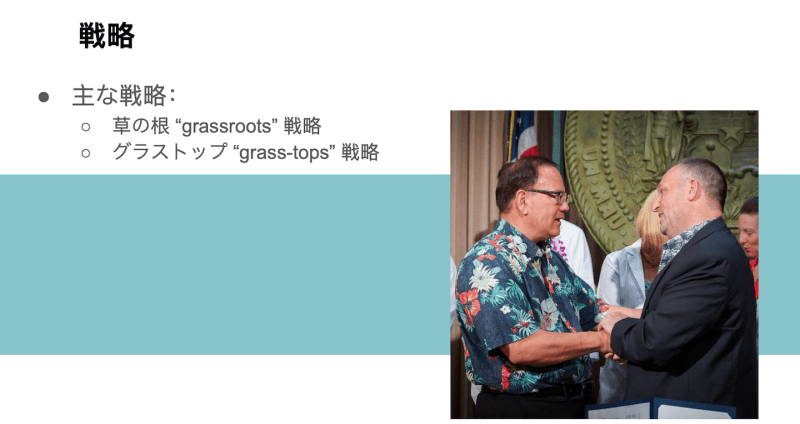
In 2022, we set a vision: to become the most influential policy organization in Hawaii.
The other side has money, manpower and prestige — but we believe we have the winning ideas.
As my boss often says: “We have to learn how to win.”
That’s exactly right. That’s why we’ve decided not just to talk to politicians, but also to reach the people who influence politicians.
Politicians are not leaders; they are followers. That’s why we use both grassroots and grasstops strategies.
Slide 7: Grassroots
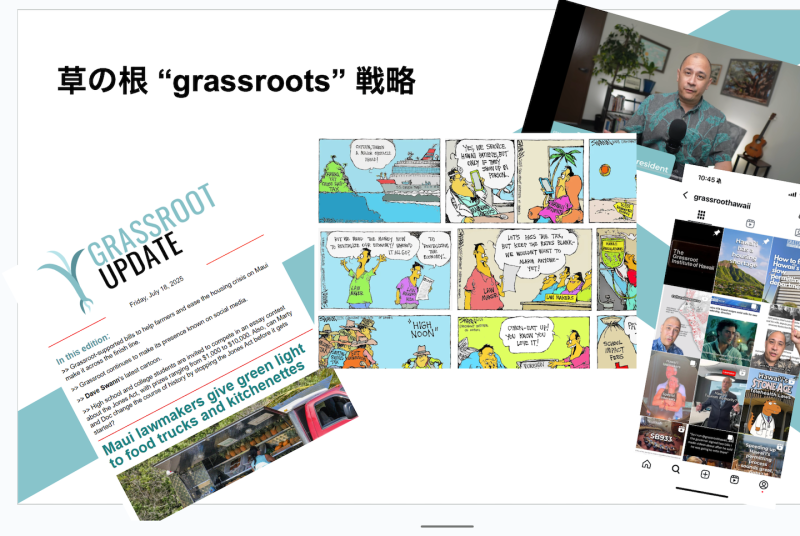
Change starts with one individual, then spreads outward like grass across society.
Alongside growing our social media presence on YouTube, Instagram and Facebook, we’ve also focused on building our email newsletter. We now have around 40,000 subscribers.
Remembering that politicians are followers, we create simple, clear videos and posts to communicate policy ideas. For example, the Hawaii Tourism Authority has the role of both promoting and restricting tourism — and it gets $60 million in taxpayer money each year. It’s usually untouchable, but we made a humorous video poking fun at it. As a result, the idea of abolishing the Tourism Authority is now being debated in the political world.
Slide 8: Grasstops
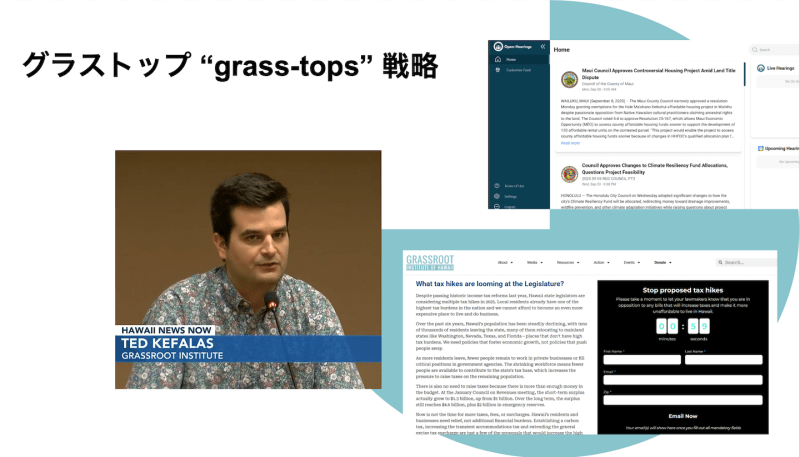
The grasstops strategy means influencing the people who directly affect policy.
To do that, we propose realistic, research-backed legislation. We have a full-time lobbyist meeting regularly with state and county politicians.
But one person has limits — so we also empower our followers to reach out directly to lawmakers.
Recently, we developed an AI-powered digital testimony tool. It lets citizens easily send in testimony, and it helped us block a proposed increase in the state capital gains tax.
We also created a tool called “Open Hearings” that uses AI to automatically transcribe government hearings and flag discussions that need close attention.
Slide 9: Takeaways
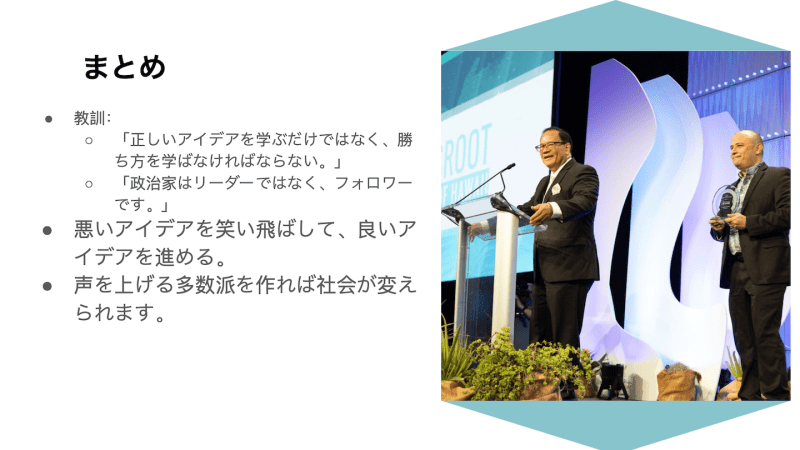
Hawaii serves as a warning of how big government can destroy people’s lives, but it’s also a source of hope: If we spread the right ideas, we can make things better.
Today, the Grassroot Institute is consistently ranked among the most impactful organizations influencing legislation each year. Now, we’re aiming to become the single most influential policy organization in Hawaii.
Hawaii and Japan share a common problem: governments that act like overbearing parents, trying to manage every aspect of life. The fight is difficult, but what matters is believing that we have the right ideas.
Not everyone will speak up, but if we can build a vocal majority, we can change society.
First, let’s laugh off the bad ideas and push forward with the good ones.
Mahalo! (Thank you!)

